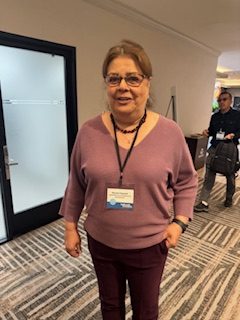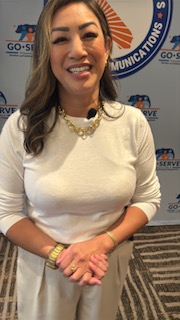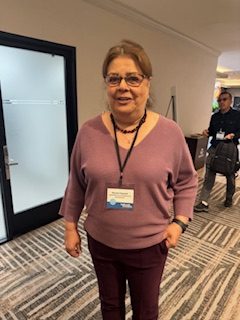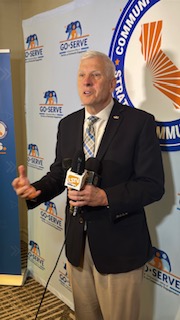California Connects: A Statewide Initiative to Build Community Partnerships and Strengthen Regional Collaboration

By Fatmeh Atieh – Al-Enteshar Al-Arabi, Los Angeles
As the federal government retreats from supporting communities, California is stepping up through the launch of California Connects—a new initiative aimed at linking and empowering local communities. The Office of Community Partnerships and Strategic Communication (OCPSC) announced the program as part of a statewide effort to build resilience and strengthen collaboration.
At a time when the nation faces deep division and political gridlock—and as the federal government continues cutting vital programs, closing official sites, and restricting access to public information and services—California has chosen a different path.
The OCPSC, under the Governor’s Office of Service and Community Engagement (GO-Serve), launched the California Connects: Regional Convenings series—a first-of-its-kind tour across eight cities throughout the state. The goal is to deliver information, resources, and opportunities directly to local communities, connecting partners and fostering collaboration.
The tour begins in San Francisco and includes regional gatherings that bring together community-based organizations (CBOs), state agencies, and local leaders to build partnerships and bridges for future cooperation.
Each convening features interactive workshops, hands-on training sessions, and expanded opportunities for networking and collaboration between state and local entities. The aim is to ensure that state resources are not only available but also accessible and tailored to meet the needs of Californians wherever they are.
On October 16, 2025, the California Connects Regional Convening was held at the Sheraton Park Hotel at the Anaheim Resort, focusing on connecting communities and partners across the state and celebrating California’s cultural diversity.
Josh Fryday, Chief Service Officer of California and Director of GO-Serve, spoke at the event, saying:

“While federal resources are being pulled back, California is doing the opposite—it’s investing in communities, opening the doors to information, and ensuring that every Californian can access the tools they need.”
Fryday emphasized that the initiative is a practical re sponse to national division and is designed to promote civic engagement and build more resilient, future-ready communities.
“In California, we believe community service and direct engagement are the foundations of a strong, connected society. This initiative allows us to unify efforts, listen to local needs, and work together on sustainable solutions that promote equity and opportunity for all,” he added.
He noted that the convenings are more than dialogue—they are actionable platforms for idea exchange and long-term partnership building, reaffirming California’s leadership in civic participation and community empowerment.
Aubrey Fong, Acting Executive Director of the OCPSC, stated:

“Our commitment as an office is to ensure all Californians have access to information and resources. At a time when federal programs are retreating, California is stepping forward—reaching residents where they are and ensuring public services get to the communities that need them most.”
Fong added that this initiative continues the office’s ongoing work to connect Californians to state programs and resources, with the ultimate goal of building stronger and more resilient communities across the state.
Through California Connects, the state reaffirms its commitment to on-the-ground engagement at a time when the federal government is pulling back from its traditional role in citizen support. The series aims to close service and information gaps, empower communities to innovate and collaborate, and build a fairer, more sustainable future for all Californians.
Each regional convening includes partners from GO-Serve programs such as the Youth Empowerment Commission, California Volunteers, and OCPSC, along with local governments, philanthropic leaders, and educational institutions. Each event is tailored to the specific region to ensure customized solutions that enhance cooperation and sustain long-term collaboration.
Al-Enteshar Al-Arabi, in collaboration with the Muslim Public Affairs Council (MPAC)—represented by Mohamed Mozdzen—had the honor of attending the event and conducting interviews with participating leaders and organizers.
California Connects Regional Convenings: Interview Highlights
Interview with Maryam Sayyedi
Omid Multicultural Institute for Development, California
Fatmeh Atieh: My first question is one I often think about: how can the Arab and Muslim community become more engaged and access your organization’s resources? How can they better connect with government offices and the activities you offer?
Maryam Sayyedi: Our organization primarily provides mental health services—counseling, therapy, assessments, and evaluations. We’re also very active in workforce development, helping trainees complete the hours needed for professional licensure. We offer social services alongside our mental health programs. Although we’re not mainly a social service agency, we help clients access affordable housing, food assistance, and SSI/SSDI benefits.

Over 14 years, we’ve learned that awareness of mental health is limited within the Middle Eastern and North African (MENA) Muslim community. Trust is key. People tend not to engage with organizations they don’t know. So the best way to start is small—family-friendly events or resource fairs where people can meet you in a welcoming space.
Collaborating with local mosques has been very effective since they are trusted institutions. Over time, we’ve built trust by setting up resource tables at different mosques. Once trust is built, the community becomes more open to engaging with us. That trust is essential before introducing other efforts like civic engagement or advocacy.
Fatmeh Atieh: Are there similar organizations in other areas like Los Angeles?
Maryam Sayyedi: Yes. In Orange County, we’re part of a coalition called SAMINA, which includes organizations serving South Asian, Middle Eastern, and North African communities. It grew out of the Asian and Pacific Islander (API) Task Force and helps us connect with other community-based organizations.
Mohamed Mozdzen (MPAC): How can organizations like the Muslim Public Affairs Council serve as intermediaries to connect your organization with these communities?
Maryam Sayyedi: That would be incredibly helpful. The key is trust. If your organization is already trusted, you can help bridge communities by hosting events, workshops, or lectures. Topics related to children—such as development, mental health, and parenting—draw people in and allow for meaningful sharing of resources. Knowledge empowers communities and reduces anxiety, especially for new immigrants navigating cultural differences.
Fatmeh Atieh: Mental health can be a sensitive topic in Arab and Muslim cultures. How can organizations engage communities while respecting their cultural and religious values?
Maryam Sayyedi: Religion has always played a role in mental health—it can be considered “the ancient psychology,” while modern psychology is the newer science. Bringing the two together—religious leaders and mental health professionals—helps communities see that the two are not in conflict but complement each other.
We’ve run programs funded by local health agencies to train 42 faith leaders in mental health awareness so they can educate their congregations. Since these leaders are trusted, their involvement helps communities become more open to discussing mental health. It all comes down to understanding, trust, and aligning cultural and religious values with education.
Senator Tom Umberg also spoke to reporters, saying:

“When nonprofits and government agencies work together, it’s like two plus two equals five,” praising the exponential impact of collaboration.
He expressed concern about recent federal funding cuts affecting community partners—many of which rely heavily on federal support—and introduced legislation to improve compensation for nonprofits, emphasizing the need for policies that prioritize support for these organizations.
Beyond service delivery, Senator Umberg underscored the importance of defending First Amendment rights and democratic values, noting the critical role community organizations play in protecting them.
The California Connects series represents a proactive step to ensure that local organizations, government agencies, and philanthropic partners collaborate to strengthen communities across the state.
Leveraging Trusted Messengers to Strengthen Public Trust in California
In an interview with Al-Enteshar Al-Arabi, Aubrey Fong, Executive Director of the Office of Strategic Communications and Partnerships for Intermediaries, emphasized the vital role of trusted messengers in state communication strategies—especially in combating misinformation and political polarization.
“The Governor’s Office and state agencies partner with community organizations, educational institutions, local governments, and volunteers to ensure that state messages reach diverse communities,” Fong said.
These trusted messengers receive accurate, timely, and culturally relevant information, enhancing the credibility and effectiveness of state messaging.
Lessons from COVID-19 and the 2020 Census
During statewide campaigns like Vaccinate All 58 and the 2020 Census, misinformation was rampant. The state relied on networks of trusted messengers to deliver verified, expert-backed information directly to communities. This approach helped maintain public trust and improve engagement with state initiatives despite widespread misinformation.
Formal and Informal Partnerships
California explores both formal and informal partnerships with religious organizations, ethnic chambers of commerce, Latin American consulates, and nonprofits. Some collaborations are supported through grant programs, while others rely on continuous engagement via:
- Virtual briefings: Monthly statewide updates from government agencies.
- Collective impact tables: Regional meetings that promote collaboration and knowledge sharing.
- In-person convenings: Special events that strengthen relationships and encourage dialogue beyond virtual platforms.
Each engagement space is designed to add value for partners by sharing information and creating collaboration opportunities.
Through these consistent and culturally sensitive communication channels, the state enhances public trust, civic participation, and resilience against misinformation—especially in politically sensitive or high-stakes contexts.
California’s model demonstrates that strategic partnerships with intermediaries—whether virtual networks, funded programs, or in-person convenings—can significantly strengthen message credibility, counter misinformation, and preserve public trust in state communications.
As Aubrey Fong concluded:
“Formal agreements like MOUs can help coordinate efforts, but the foundation lies in consistent engagement, trust-building, and culturally relevant communication.”


